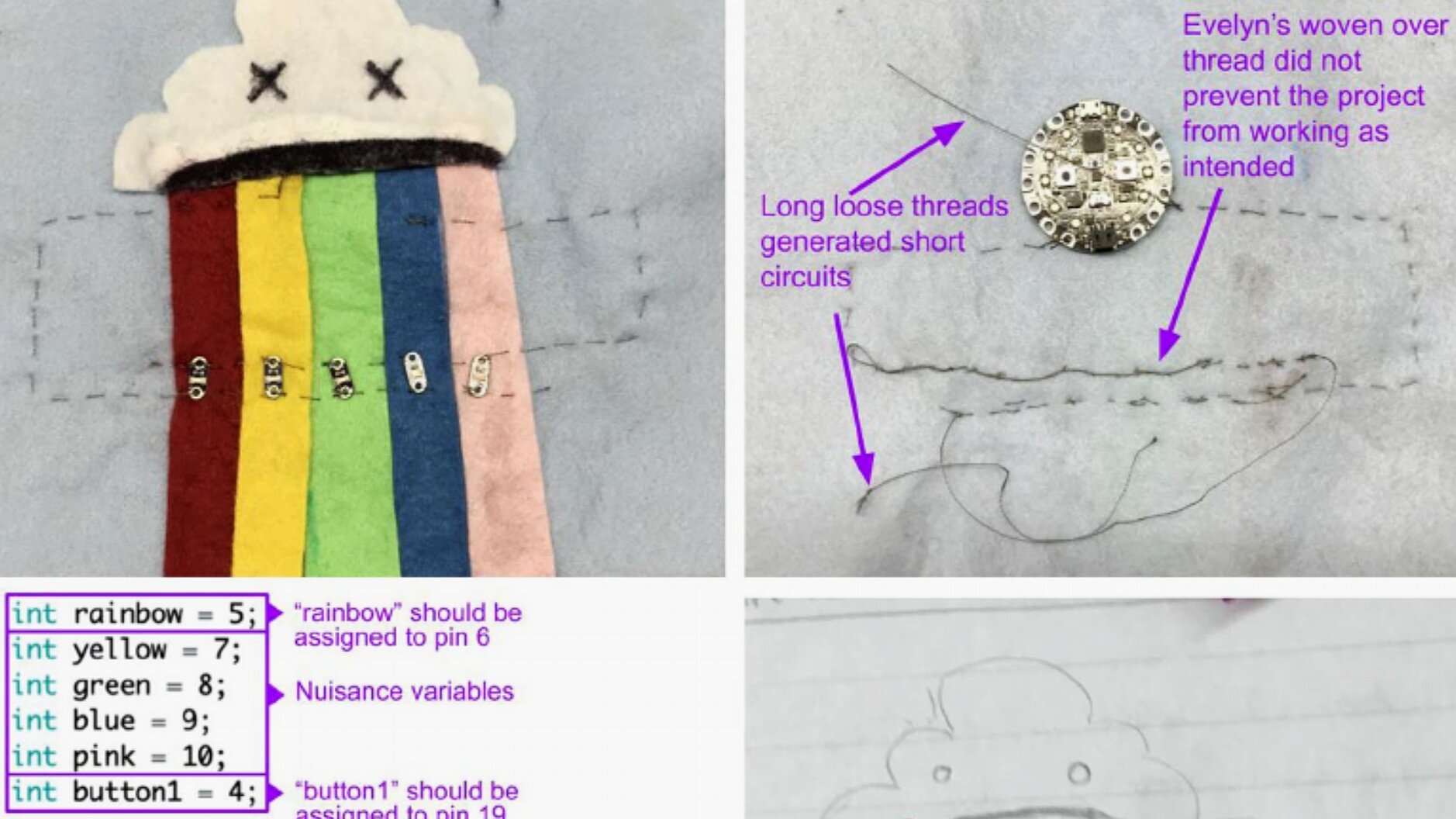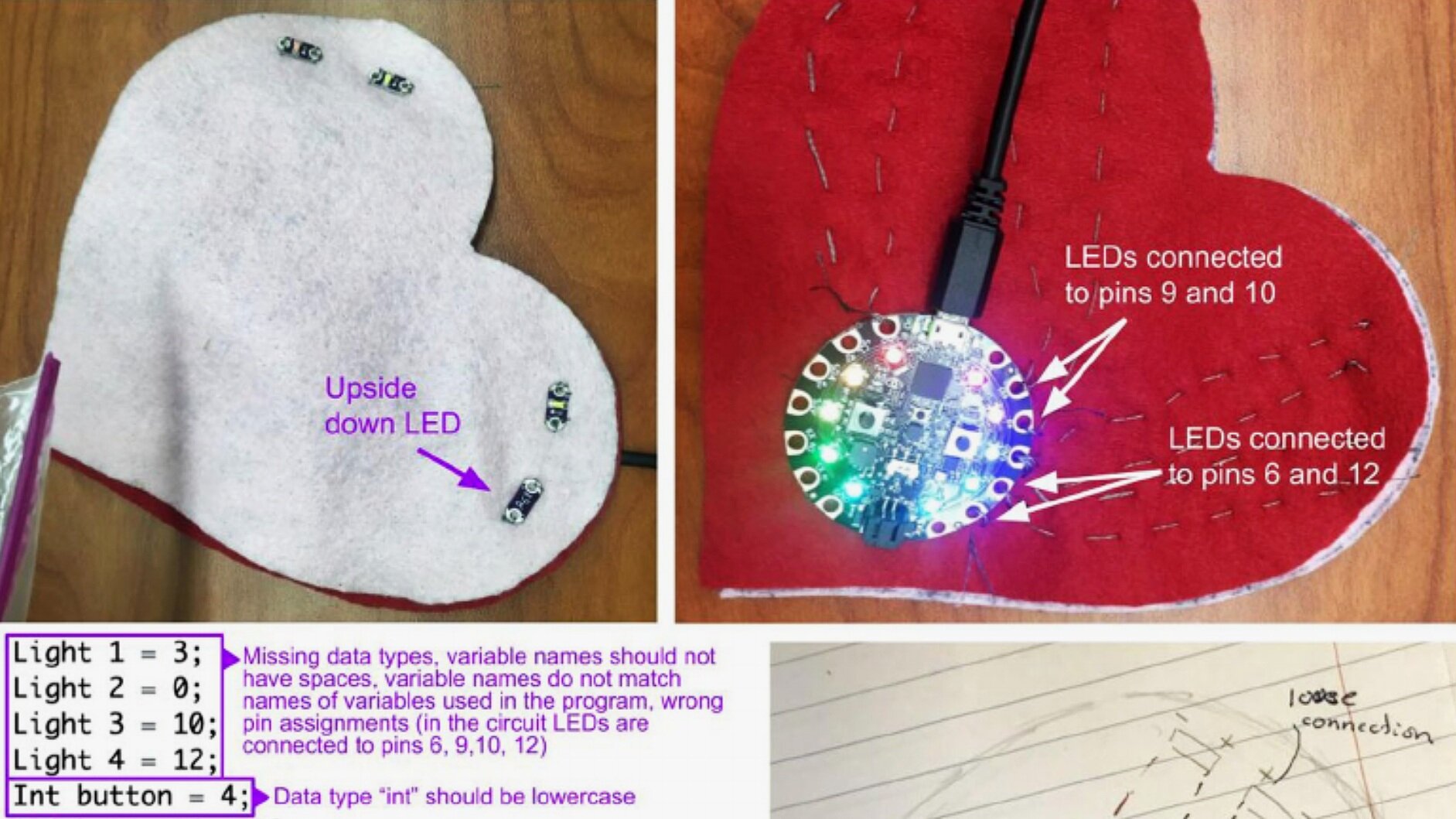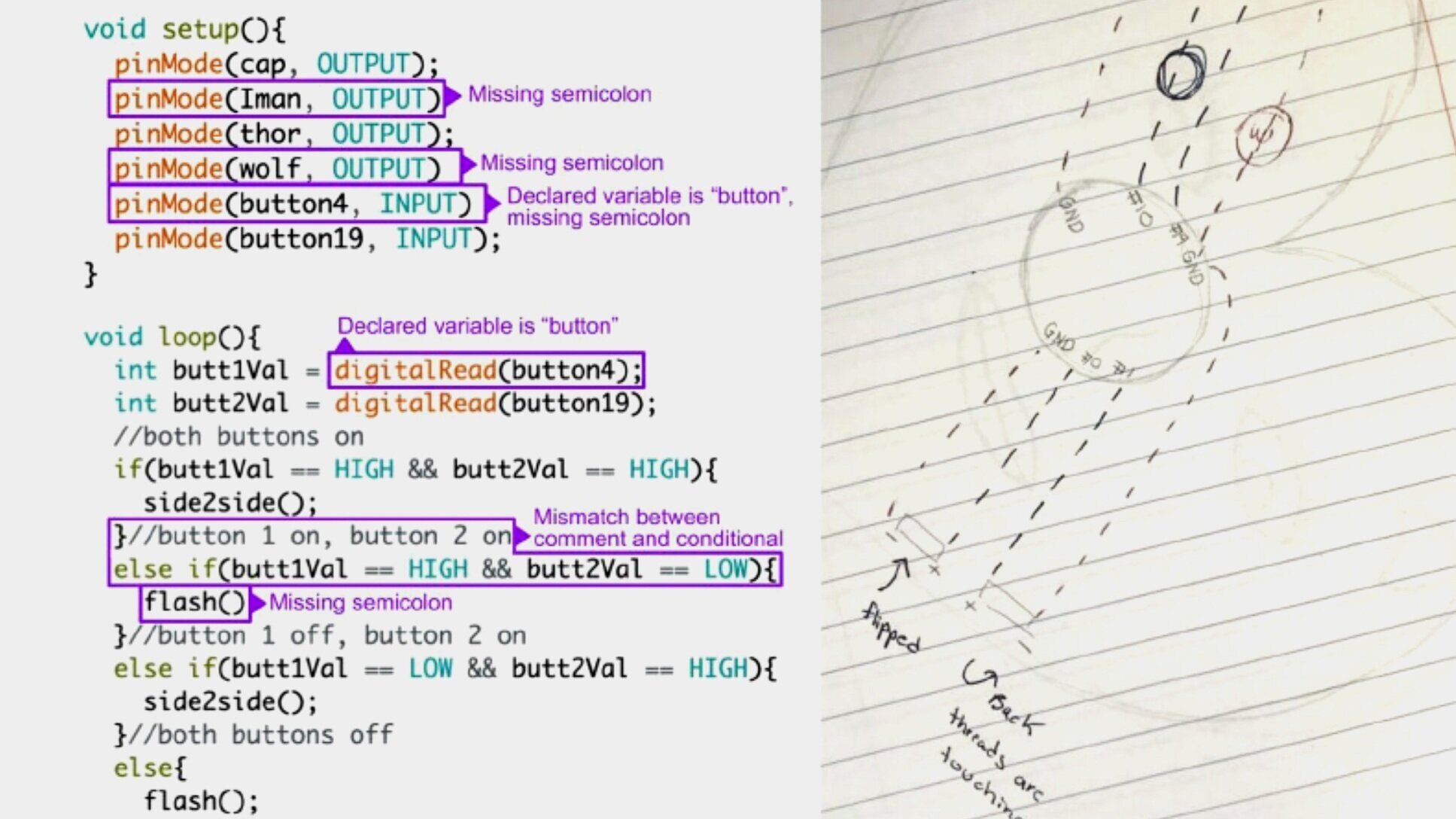Debugging by Design
Much attention has focused on designing tools and activities that support learners in designing fully finished and functional applications to be shared with others. But helping students learn to debug their applications often takes on a surprisingly more instructionist stance by giving them checklists, teaching them strategies or providing them with test programs. The idea of designing bugs for learning—or debugging by design—makes learners agents of their own learning and, more importantly, of making and solving mistakes. Studies reviews what kind of bugs students design, how they engage in collaboratively identify and resolve bugs in e-textile artifacts, and how teachers can integrate this approach into their computer science classrooms. See the link to the UC Boulder partner website for more details.
Contributors
Deborah Fields, Luis Morales-Navarro, Gayithri Jayathirtha, Michael Giang
Related Research
Morales-Navarro, L., Fields, D. A., Kafai, Y. B. (2021). Growing mindsets: Debugging by design as a learning environment for promoting high school students’ growth mindset practices in a computer science class. In de Vries, E., Hod, Y., & Ahn J. (Eds.). Proceedings of the 15th International Conference of the Learning Sciences - ICLS 2021. Bochum, Germany: International Society of the Learning Sciences, pp. 362-369. Best Student Paper — Naomi Miyake Award
Fields, D. A., Kafai, Y. B., Morales‐Navarro, L., & Walker, J. T. (2021). Debugging by design: A constructionist approach to high school students' crafting and coding of electronic textiles as failure artefacts. British Journal of Educational Technology, 00, 1- 15. Link to free access
Fields, D. A. & Kafai, Y. B. (2020). Debugging by Design: Students’ Reflections on Designing Buggy E-Textile Projects. In B. Tangney, J. Bryne, and C. Girvan (Eds.), Proceedings of Constructionism 2020 (pp. 265-273). Dublin, Ireland. ISBN 978-1-911566-09-0. Link to PDF
Jayathirtha, G., Fields, D. A., & Kafai. Y. B. (2020). Pair debugging of electronic textiles projects: Analyzing think-aloud protocols for high school students’ strategies and practices while problem solving. In M. Gresalfi, M. & I. S. Horn (Eds.), The Interdisciplinarity of the Learning Sciences, 14th International Conference of the Learning Sciences (ICLS) 2020, Volume 2, Nashville, TN: International Society of the Learning Sciences, pp. 1047-1054. Link to PDF
Kafai, Y. B., Biswas, G., Hutchins, N., Snyder, C., Brennan, K., Haduoan, P., DesPortes, K., Fong, M., Flood, V.J., Walker-van Aalst, O., DeLiema, D., Fields, D. A., Gresalfi, M., Brady, C., Steinberg, S., Knowe, M., Franklin, D., Coenraad, M., Weintrop, D., Eatinger, D., Palmer, J., Wilkerson, M., Roberto, C., Bulalacao, N. M., Danish, J. (2020). Turning bugs into learning opportunities: Understanding debugging processes, perspectives, and pedagogies. In M. Gresalfi, M. & I. S. Horn (Eds.), The Interdisciplinarity of the Learning Sciences, 14thInternational Conference of the Learning Sciences (ICLS) 2020, Volume 2, Nashville, TN: International Society of the Learning Sciences, pp. 374-381. Link to PDF
Fields, D. A., Lui, D. A., & Kafai, Y. B. (2019). Teaching Practices that Support Iterative Design in the Electronic Textiles Exploring Computer Science Unit. In S.C. Kong and H. Abelson (Eds.), Computational Thinking Education (pp. 279-294). New York, NY: Springer. Link to free access
Fields, D. A., Jayathirtha, G., & Kafai. Y. B. (2019, June). Bugs as a nexus of emergent peer collaborations: Contextual and classroom supports for solving problems in electronic textiles. In Lund, K., Niccolai, G., Lavoué, E., Hmelo-Silver, C., Gweon, G., Baker, M. (Ed.) A Wide Lens: Combining Embodied, Enactive, Extended, and Embedded Learning in Collaborative Settings, 13th International Conference on Computer Supported Collaborative Learning, Volume 1. Lyon, France: International Society of the Learning Sciences, 472 - 479. Link to PDF
Kafai, Y. B., DeLiema, D., Fields, D. A., Lewandowski, G., & Lewis, C. (2019). Rethinking Debugging as Productive Failure for CS Education. In Proceedings of the 50th ACM Technical Symposium on Computer Science Education (SIGCSE '19) (pp. 169-70). New York, NY: ACM. Link to PDF
Jayathirtha, G., Fields, D. A., & Kafai, Y. B. (2018). Computational concepts, practice and collaboration in high school students’ debugging electronic textile projects. In. Kong, S.C., Andone, D., Biswas, G., Crick, T., Hoppe, H.U., Hsu, T.C., Huang, R.H., Li, K.Y., Looi, C.K., Milrad, M., Sheldon , J., Shih, J.L., Sin, K.F., Tissenbaum, M., & Vahrenhold, J. (Eds.), Proceedings of the International Conference on Computational Thinking Education 2018 (pp. 27-32). Hong Kong, China: The Education University of Hong Kong. Link to free access
Searle, K. Litts, B., & Kafai, Y. B. (2018). Debugging Open-Ended Designs: High School Students' Perceptions of Failure and Success in an Electronic Textile Design Activity. Thinking Skills & Creativity, 30, 125-134.
Litts, B. K., Kafai, Y. B., Searle, K. A., & Dieckmeyer, E. (2016). Perceptions of Productive Failure in Design Projects: High School Students’ Challenges in Making Electronic Textiles. In Looi, C.-K., Looi, C. K., Polman, J. L., Cress, U., and Reimann, P. (Eds.). (2016). Transforming Learning, Empowering Learners: The International Conference of the Learning Sciences (ICLS) 2016, Volume 2 (pp. 1041-1047). Singapore: International Society of the Learning Sciences. Link to PDF



